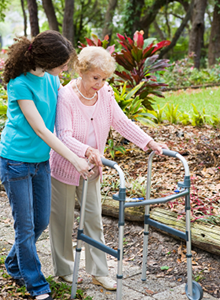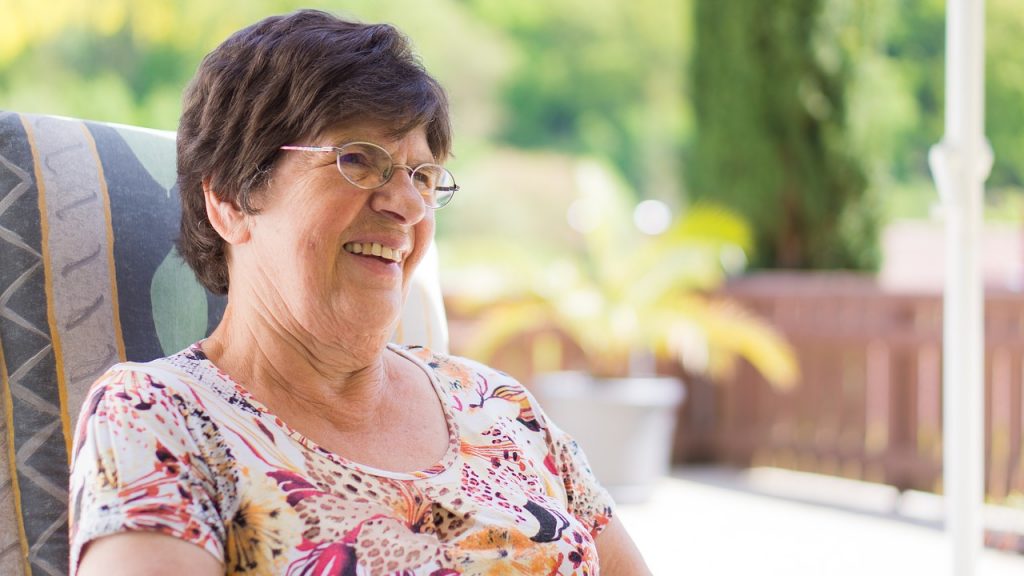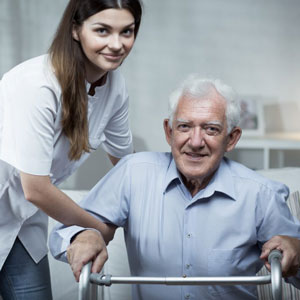An introduction to physiotherapy for the elderly
We offer a specially tailored service of physiotherapy for the elderly or patients with decreased independence. Treatments are part of our physiotherapy at home service. In the first instance, we find out about the problems that you or a loved one are having; it could be finding it difficult to get up from a chair, walking up or down stairs or dressing. Conditions that can benefit from ongoing physiotherapy include Parkinson’s Disease and strokes.
What is Parkinson’s Disease?
Parkinson’s disease is an idiopathic disease. This means its cause is unknown. It is a chronic and progressive neurological disease that is caused by a loss of a chemical in the brain called DOPAMINE. It is not a brain tumour, form of MND or Alzheimer’s; there are no blood tests for diagnosis which is based on clinical examination. Often. friends and family are the ones who spot the first signs. It usually develops in people over the age of 60 and is more prevalent in men.
 Can physiotherapy help with Parkinson’s Disease?
Can physiotherapy help with Parkinson’s Disease?
Ongoing physiotherapy can be hugely beneficial. A specialist neurological physiotherapist will help you in a variety of ways after a first initial assessment. Treatments will include:
- Improvement of balance and posture
- Gait re-education
- Pain reduction
- Increasing joint range of movement and strengthen muscles
- Falls prevention
- Self-management advice
The Chartered Society of Physiotherapy states that Physiotherapy involvement is supported by a growing evidence base of high-quality research in the treatment of Parkinson’s disease. Physiotherapy-specific exercises can help keep to a minimum any loss of strength, balance and movement due to the effects of Parkinson’s disease.
At Harpenden Physiotherapy, we have portable electrotherapy machines and provide hands on treatment for painful and stiff muscles and joints and will provide you with individualised exercise programmes that will help you to regain your muscle strength, balance and general fitness leading to greater independence at home.
Treatment and care for you
Physiotherapy for the elderly can be provided in the comfort of your own home. We can also advise you and your carers or family on suitable home aids and adaptations to make your life easier and give you and them peace of mind.
Ongoing therapy includes:
- Electrotherapy and hands-on treatment
- Strengthening exercise programmes to target weak muscles and balance programmes to help prevent falls
- Activities to boost fitness levels
- Breathlessness management
- Rehabilitation from Long Covid in the elderly
- Advice on how to find comfortable sleeping positions and bed sore prevention
- Treatment for and advice on how to manage painful or swollen joints
- Support and advice for your carers and family members
- Helping to improve your safety in your home
Frequently asked questions
How can I tell if a family member has Parkinson's Disease?
There are multiple signs and symptoms. This is because Dopamine controls our emotional responses and movement. Diagnosis depends on a number of signs being present. These signs come on very slowly. Early signs of Parkinson’s disease will include a tremor at rest; this often goes away on movement. Your handwriting may alter and become smaller and more crowded on the page. Losing your sense of smell is another sign and increased muscle tension leading to aching joints. Constipation, nightmares and poor sleep, a quieter voice and the most usual signs a blank face that is called MASKING and a slow shuffling gait. Parkinson’s disease has also been linked to low blood pressure so regular feeling of faintness can be a symptom. Over time as your Parkinson’s progresses poor posture and depression can develop.
There is absolutely no need to panic. Most of us have some of these symptoms at one time in our lives, and Parkinson’s disease is a combination of these symptoms and only present when these symptoms do not go away.
What is the first step if I have Parkinson's Disease?
If you are concerned you may have Parkinson’s disease go and see your GP who will refer you to a Neurologist and they will create a multidisciplinary care plan for you which will be a combination of medication, occupational and speech therapy and of course physiotherapy.
What is a stroke?
A stroke, or CVA (cerebrovascular accident), occurs when the blood supply to part of the brain is cut off causing damage to the affected area. The main symptoms of a stroke can be remembered by the word F.A.S.T:
Face: the face may have dropped on one side, most noticeably around their eye or mouth. You can ask the person to smile to check if the movement is the same on the both sides
Arms: there is often weakness on one side of the body. Check to see if the person is able to move their arms and legs.
Speech: Speech may be slurred or garbled or the person may not be able to speak at all despite appearing to be awake
Time: If a stroke is suspected call 999. The sooner a person receives treatment the less damage is likely to happen
Can physiotherapy help after a stroke?
Physiotherapy is an important part of your rehabilitation and recovery. After a stroke, we cannot grow new brain cells to replace the damage ones but the brain has the ability to reorganise existing cells to make up for what was lost; this is called neuroplasticity. Rehabilitation will guide the neuroplasticity to relearn movement and regain function.
Physiotherapy can help by:
 Improving strength and balance
Improving strength and balance- Normalising patterns of movement
- Reducing tone and spasticity
- Improving range of movement
- Helping reduce pain
- Improving functional ability
- Improving transfers and mobility
- Gait (walking) re-education
Frequently asked questions
What are symptoms of a stroke?
A stroke often affects the part of the brain that control movement. They can leave the individual with a weakness, often on one side, and difficulty moving and doing everyday activities.
Other symptoms you may experience include:
- Muscle spasm
- Joint pain
- Balance problems
- Difficulty speaking or understanding speech
- Difficulty swallowing
- Visual disturbances
- Difficulties with spatial awareness
- Confusion
- Extreme fatigue
What are the causes of Stroke?
There are two main causes of stroke; ischaemic and haemorrhagic. An ischaemic stroke is where the blood supply is cut off due to a blood clot. This is the most common cause and accounts for 85% of strokes. The second type, called a haemorrhagic stroke, is due to a bleed on the brain as a result of a burst blood vessel.
Certain conditions increase the risk of stroke such as high blood pressure, diabetes, high cholesterol and atrial fibrillation. If you have any of these risk factors it is important to speak to your GP to ensure they are effectively controlled.
Call us today
 Gail Marsh is an experienced neurological physiotherapist who has a great understanding of all elderly care rehabilitation needs and a special interest in falls prevention and multi pathology frailty. She works in the clinic 2 days a week and also treats patients in their homes to aid their independence and can advise on how to make your home a safe environment. This is especially useful to those patients who do not wish to, or are no longer able to, travel and need help to remain independent at home.
Gail Marsh is an experienced neurological physiotherapist who has a great understanding of all elderly care rehabilitation needs and a special interest in falls prevention and multi pathology frailty. She works in the clinic 2 days a week and also treats patients in their homes to aid their independence and can advise on how to make your home a safe environment. This is especially useful to those patients who do not wish to, or are no longer able to, travel and need help to remain independent at home.
If you would like to book an appointment with Gail please call on 01582 761448
Alternatively, get in touch if you’d like to find out more about how our physiotherapy for the elderly can help you gain more independence or help a loved one feel more comfortable. Wherever you are, you are welcome to visit our Harpenden clinic or we can offer a home visit service to Harpenden Luton Dunstable Caddington Leighton Buzzard Linslade Markyate Ampthill and Flitwick








